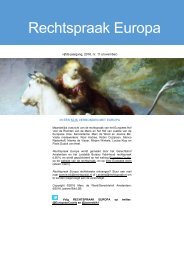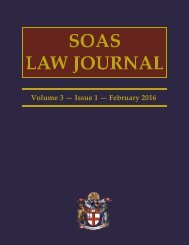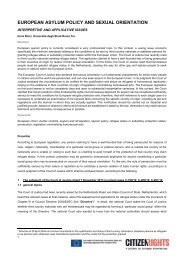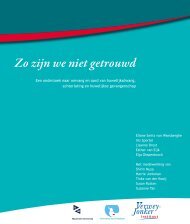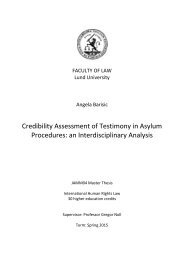AEMI
AEMI-2016-web
AEMI-2016-web
Create successful ePaper yourself
Turn your PDF publications into a flip-book with our unique Google optimized e-Paper software.
PAUL-HEINZ PAUSEBACK<br />
ing. He never got rich and advised his<br />
younger brother better to stay at home.<br />
When he became older he gave up digging<br />
and worked as a schoolmaster; he<br />
never returned to Schleswig-Holstein.<br />
On the other hand there were many<br />
men, especially from the North-Frisian<br />
islands, who wished to return, but<br />
were not allowed to come back, because<br />
they left the country without permission<br />
before they served their time in<br />
the Prussian armed forces. Emigration<br />
and compulsory military service were<br />
connected closely, and not only because<br />
young men between seventeen<br />
and twenty-seven are the most mobile<br />
part of any population (Pauseback, Aufbruch,<br />
317-33). The first law that was<br />
enacted in the new Prussian province<br />
Schleswig-Holstein in October 1866,<br />
regulated the new military service of<br />
three years for every able 21 year old<br />
man. Compulsory military service was<br />
unusual in Schleswig-Holstein, so there<br />
was a general dislike for it, intensified<br />
by the common fear regarding the strict<br />
discipline in the Prussian army. This<br />
was especially the case in the northern<br />
Danish speaking parts of the Duchy of<br />
Schleswig where Prussian rule was principally<br />
rejected, and among the inhabitants<br />
of the North-Frisian islands, who<br />
according to old privileges had been exempted<br />
from military service in times of<br />
peace. In times of war they served in the<br />
fleet, for the men mostly were sailors.<br />
So from the very start the Prussian<br />
administration in Schleswig-Holstein<br />
suspected that many young man left the<br />
country only to avoid military service<br />
and sought for ways to prevent that. But<br />
few things can stop a young man from<br />
emigrating, if he has set his mind to it.<br />
105<br />
In 1880 it was believed by the authorities<br />
that the returning migrants gave<br />
them a starting point to act. This has<br />
to be seen in relationship with the Bancroft<br />
treaty from February 22nd 1868<br />
between the North German Federation<br />
and the United States of America<br />
regarding the citizenship of emigrants. 9<br />
It said that an emigrant from the area<br />
of the North German Federation, who<br />
had become a citizen of the United<br />
States after a continuous residence of<br />
five years, will be treated as an American<br />
citizen when he returns. If he should<br />
stay longer than two years it would be<br />
regarded as an abandonment of the U.S.<br />
citizenship. This regulation became<br />
necessary because German (Prussian)<br />
citizenship ceased only after a ten years<br />
continuous residence outside Germany.<br />
So the Bancroft treaty was designed to<br />
avoid dual citizenship, and to make<br />
possible shorter visits up to two years,<br />
regardless of whether the emigrant had<br />
been a soldier or not.This treaty seems<br />
to give the young men the chance to<br />
leave the country before they became liable<br />
to military service, i.e. before their<br />
seventeenth birthday, and return after<br />
five years as American citizens – and the<br />
Prussian authorities could do nothing<br />
against it.<br />
In the 1870s not many emigrants<br />
came back and those who did were not<br />
really controlled. Looking back, the<br />
head of a local district on the island Föhr<br />
wrote in 1891 that many had thought<br />
that it would always stay that way, but<br />
when visitors arrived in greater numbers<br />
at the end of the 1870s, things began<br />
to change. The authorities registered the<br />
influence they had on the population at<br />
home, spreading stories of success from



